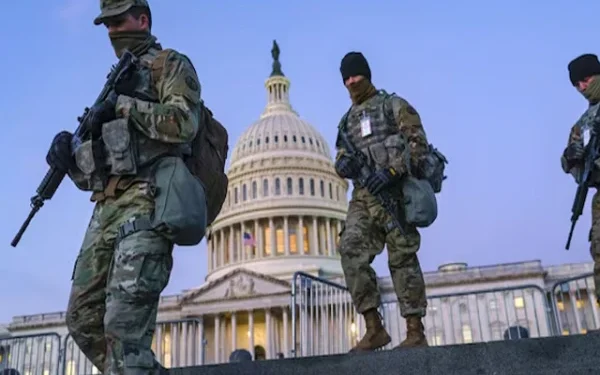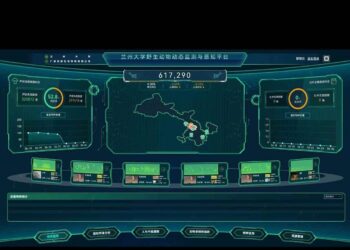The streets of Washington, DC are set to witness an unprecedented development as US National Guard troops will begin patrolling the capital armed with weapons, starting Sunday night. This measure comes as part of President Donald Trump’s aggressive crackdown on crime, a move that has sparked intense national debate, dividing political leaders, security experts, and ordinary citizens.
According to official statements, National Guard personnel will be carrying M17 pistols or M4 rifles during patrols. However, officials have not disclosed the exact number of troops who will be armed, fueling speculation about the scale and scope of the operation.
For the past two weeks, hundreds of unarmed National Guard members have already been deployed across the capital to assist local law enforcement. Their presence followed Trump’s declaration of a “crime emergency” in Washington DC, a city governed by Democratic leadership.
The escalation from unarmed patrols to armed military presence marks a significant shift in strategy, raising pressing questions about public safety, constitutional authority, and civil liberties.
Background: Why National Guard Troops Are Being Deployed
The decision to arm National Guard troops is the result of a sharp rise in violent crime across Washington DC in recent months. The capital has witnessed an alarming increase in homicides, armed robberies, and assaults, intensifying pressure on city officials and the federal government to act.
President Trump, campaigning heavily on a “law-and-order” agenda, has made cracking down on crime a central theme of his administration. Critics argue that the deployment of the military in civilian spaces is more of a political move than a practical solution to crime.
Historically, the National Guard has been deployed in Washington DC during moments of crisis—most recently during the Black Lives Matter protests in 2020 and the January 6th Capitol riots in 2021. However, the current deployment is distinct, as it is framed not as a response to mass unrest but as a preventive policing strategy.
Weapons and Rules of Engagement
The decision to allow troops to carry M17 pistols and M4 rifles has caused concern among civil rights advocates. Both weapons are military-grade, capable of delivering lethal force.
A written statement from the National Guard’s Joint Task Force-DC clarified the rules of engagement:
- Troops will use force only as a last resort.
- Weapons will only be used in response to an immediate threat of death or serious bodily harm.
- National Guard members are trained to support, not replace, civilian law enforcement agencies.
Despite these assurances, many fear that the visual presence of armed soldiers on city streets could intimidate residents and escalate tensions rather than reduce crime.
The Role of Defense Secretary Pat Hegseth
Last week, Defense Secretary Pat Hegseth formally authorized National Guard troops in Washington DC to carry weapons. The authorization followed intense discussions between the Pentagon and the White House, reflecting the controversial nature of the decision.
Defense officials have emphasized that the deployment is meant to support local police rather than take over their duties. Still, critics warn that arming troops in a civilian context blurs the line between military operations and law enforcement, raising constitutional and legal concerns.
Trump’s Broader Crime Crackdown Strategy
President Trump has signaled that Washington DC is only the first step in a broader national crackdown on crime. He has already mentioned the possibility of extending similar measures to Chicago, another city governed by Democrats, which has long struggled with high levels of gun violence.
Trump’s rhetoric frames Democratic-controlled cities as “lawless zones” in need of federal intervention. Supporters view this as a bold step toward restoring order, while opponents argue it is a political strategy to discredit Democratic leadership and expand executive authority.
Political Fallout: Democrats Push Back
The move has triggered strong opposition from Democratic leaders.
House Minority Leader Hakeem Jeffries criticized the deployment, stating that Trump does not have the authority to send troops into Chicago or other cities without state or local consent. He accused the president of politicizing national security for electoral gain, warning that such actions set a dangerous precedent.
Local officials in Washington DC have also expressed frustration, noting that the district lacks full statehood powers, which allows federal authorities to override local decisions more easily than in other US cities.
Civil Liberties and Public Reaction
Civil liberties groups, including the American Civil Liberties Union (ACLU), have raised concerns about the potential misuse of military force in a civilian setting.
Key concerns include:
- Intimidation of residents: The sight of armed soldiers on city streets may make communities feel like they are under martial law.
- Risk of escalation: Armed troops, even with strict rules of engagement, increase the likelihood of deadly encounters.
- Erosion of trust: Many residents already distrust law enforcement. The presence of soldiers could deepen this divide.
Public reaction in Washington DC has been mixed. Some residents welcome the additional security, citing fears of crime, while others worry about the militarization of their neighborhoods.
Historical Context: Military in Domestic Law Enforcement
The United States has a complicated history with military involvement in domestic affairs.
- The Posse Comitatus Act of 1878 generally prohibits the use of federal troops for domestic law enforcement.
- The National Guard, however, operates under different rules and can be deployed by governors or the president during emergencies.
- Previous deployments in Washington DC during civil rights protests, riots, and natural disasters have usually been temporary and narrowly focused.
Critics argue that Trump’s decision to arm National Guard troops in response to crime trends represents a new and troubling precedent, where military power is normalized in everyday policing.
Expert Opinions: Does This Strategy Work?
Security experts remain divided on the effectiveness of deploying the National Guard for crime control.
- Supporters argue that visible military presence can act as a deterrent to criminals, boosting public safety in high-crime areas.
- Opponents contend that crime is best addressed through long-term social policies—such as education, job creation, and community engagement—rather than military patrols.
Professor Mark Cancian, a defense policy analyst, stated that while the Guard can provide short-term relief, “military troops are not trained for community policing. Their presence may stabilize a situation temporarily but does not solve the root causes of crime.”
Potential Risks and Future Outlook
As armed troops take to the streets of Washington DC, several risks loom:
- Escalation of Violence – Any confrontation between troops and civilians could spiral into violence, triggering widespread unrest.
- Political Weaponization – Trump’s opponents argue that the move is part of a broader strategy to frame Democrats as “soft on crime.”
- National Precedent – If normalized, the use of armed troops in civilian law enforcement could spread to other cities, changing the nature of American democracy.
Looking ahead, much will depend on how the deployment unfolds in practice. If troops maintain discipline and crime rates decline, Trump may claim success. But if incidents of abuse or violence occur, the backlash could be severe, both politically and socially.
Conclusion: A Defining Moment for American Democracy
The deployment of armed National Guard troops in Washington DC marks a defining moment in the intersection of law enforcement, politics, and civil liberties. While the Trump administration insists the measure is necessary to restore order, critics view it as an alarming step toward the militarization of American cities.
As Washington DC residents prepare to see soldiers with M17 pistols and M4 rifles on their streets, the nation watches closely. Will this strategy bring safety and security, or will it deepen divisions and fuel unrest?
One thing is certain: the outcome of this decision will have far-reaching implications, not just for Washington DC, but for the future of civil-military relations and democracy in the United States.

























